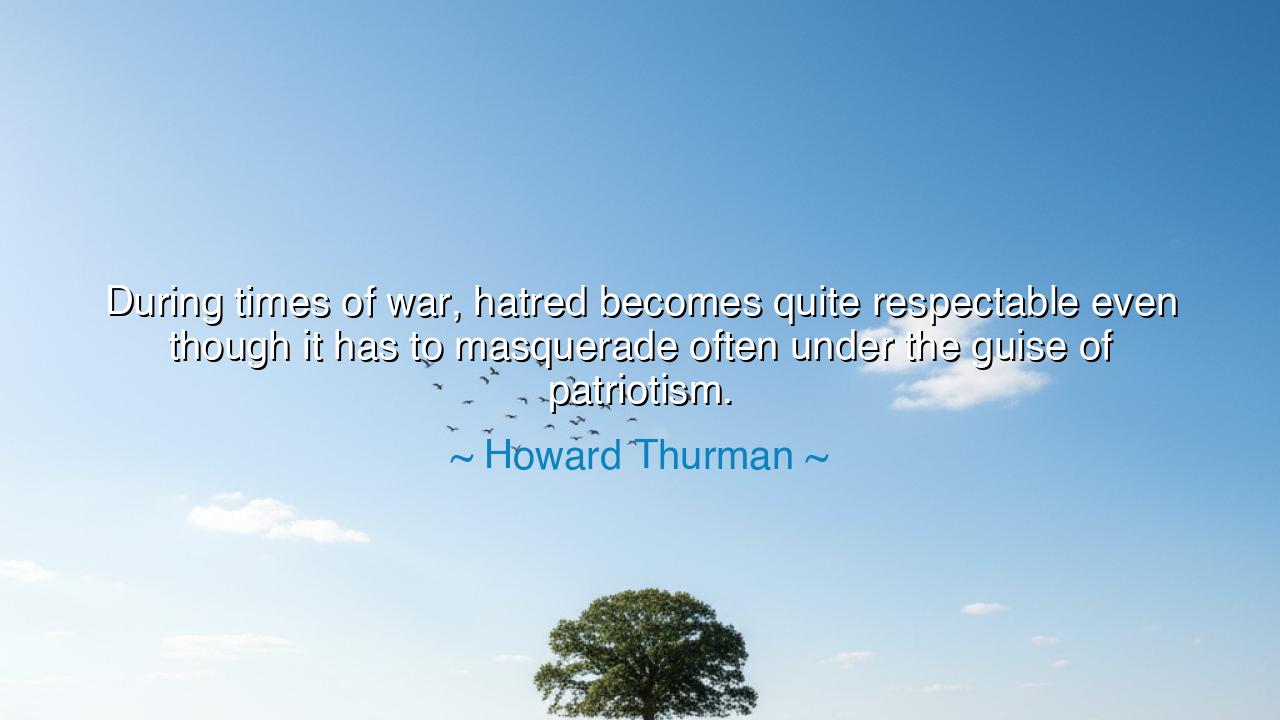
During times of war, hatred becomes quite respectable even
During times of war, hatred becomes quite respectable even though it has to masquerade often under the guise of patriotism.






Hearken, children of the future, and attend with care to the wisdom of Howard Thurman, who observed that in the furnace of war, hatred often assumes the cloak of patriotism, appearing respectable while concealing its darker impulses. In times of strife, the hearts of men and women are inflamed with passion, and noble virtues can be twisted to serve base desires. Thurman warns us that the guise of loyalty and devotion to the nation can mask impulses of vengeance, fear, and animosity, leading even the righteous to commit acts they might not otherwise contemplate in times of peace.
The origin of this reflection lies in the long experience of humankind, where the glory of the battlefield has often been shadowed by the corrosive influence of hatred. Across the ages, warriors have marched under banners of freedom, honor, and patriotism, yet in the fury of combat, the enemy becomes dehumanized, and moral clarity is clouded. Thurman, a thinker deeply attuned to the interplay of morality and human emotion, sought to reveal the subtle danger: that patriotism, when untempered by compassion and wisdom, can become a mask for destructive impulses, legitimizing cruelty and fostering cycles of enmity.
Consider the historical example of World War I, where entire nations were swept into the maelstrom of conflict. Propaganda, cloaked as patriotism, urged men to despise their enemies, to cultivate hatred as a civic virtue. Ordinary citizens, believing in their duty to the nation, sometimes sanctioned acts of brutality that, in calmer times, would have been unthinkable. Thurman’s words echo in this history, revealing how hatred gains respectability when draped in the garments of national loyalty, and how easy it is for noble sentiment to be co-opted by fear and aggression.
Yet within this warning lies a deeper lesson about the human spirit. Thurman does not merely diagnose a danger; he challenges us to cultivate discernment, to recognize the thin line between patriotism and enmity, and to act with integrity even amid the storms of conflict. The true measure of loyalty to one’s nation is not in the intensity of hatred for enemies, but in the courage to uphold justice, mercy, and humanity, even when confronted by threats and violence. This is the wisdom of the ancients: that the soul’s nobility is proven in the restraint and discernment it exercises under pressure.
We may also reflect upon the example of Abraham Lincoln during the American Civil War. Though the nation was torn apart, and emotions ran high, Lincoln understood that hatred, even for those who sought to divide the country, must be carefully balanced with justice and compassion. His leadership sought to preserve the Union while envisioning a postwar reconciliation, tempering the fires of resentment with vision and moral courage. Here is a living illustration of Thurman’s teaching: the recognition that patriotism should never be an excuse for unbridled hatred, but a call to act wisely and honorably.
From this reflection flows a practical lesson for every generation: be vigilant against the seduction of hatred cloaked as loyalty. Examine carefully the motives behind your actions and the passions that inflame your heart. In disagreements, in conflicts, in civic life, cultivate empathy and understanding; act from principles rather than anger; and resist the temptation to dehumanize those with whom you differ. In doing so, your love of country remains pure, grounded in virtue rather than in vengeance.
Thurman’s words also call upon us to educate our communities about the subtleties of moral discernment. Encourage dialogue that tempers fervor with reason, that channels civic pride into constructive action, and that transforms patriotism into a force for justice, peace, and communal well-being. In this way, the nation’s strength does not arise from hatred, but from wisdom, restraint, and the shared commitment to uphold what is righteous and enduring.
Thus, children of tomorrow, inscribe upon your hearts this eternal truth: in times of war and strife, hatred may masquerade as patriotism, but the soul of the virtuous resists this deception. Let your loyalty be tempered with discernment, your courage guided by morality, and your devotion to your nation expressed through acts that uplift, not destroy. For it is in this balance, between love of country and love of justice, that true patriotism endures, shining across generations as a beacon of wisdom and humanity.






AAdministratorAdministrator
Welcome, honored guests. Please leave a comment, we will respond soon